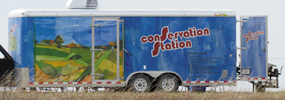 Along with locally grown food and baked goods, patrons of this week’s Greene County farmers market can learn about the importance of healthy soil and clean water, and even play the “Poo Toss” to win prizes.
Along with locally grown food and baked goods, patrons of this week’s Greene County farmers market can learn about the importance of healthy soil and clean water, and even play the “Poo Toss” to win prizes.
The Conservation Station, a mobile learning center coordinated by Water Rocks!, will be at the June 14 farmers market.
Visitors to the Conservation Station can learn how everyone can do their part to help preserve and protect soil and water—essential natural resources. The free, fun, hands-on activities and demonstrations for kids and adults teach about watersheds and the effects of rainfall on the land. A popular activity is the “Poo Toss” where participants try to throw rubber doggy poo into wastebaskets for prizes and learn why picking up animal waste is a good thing.
The Conservation Station’s rainfall simulator offers a strong visual of how land management choices affect soil and water. The rainfall simulator demonstrates the effects of rainfall on different surfaces in agricultural and urban environments. Water runoff and subsurface drainage are collected in clear jars to show what is coming off the various soil surface types including tilled soil, cover crops, green roofs and pervious pavement.
Since 2010, the Conservation Station has traveled to every county in Iowa for community festivals, county fairs, field days, farmer’s markets, and school visits. Visit the Water Rocks! website to see the schedule of Conservation Station appearances and to request a visit for an event: www.waterrocks.org.
Water Rocks! is a statewide youth water education campaign that uses a variety of resources to bring awareness and appreciation of water. Through classroom visits, an interactive website, an award-winning computer game, songs, music videos, dogs, enhanced learning activities, teacher/peer mentor workshops and geocaching, Water Rocks! offers an original, light-hearted approach to water issues.
For more information, visit www.waterrocks.org. Follow Water Rocks! on Facebook and Twitter. Water Rocks! partners include: Iowa State University Extension and Outreach, Iowa Department of Natural Resources (United States Environmental Protection Agency), Leopold Center for Sustainable Agriculture, Iowa Water Center, Iowa Learning Farms and personal gifts of support.
This cooperative project has been funded in part through Section 319 of the Clean Water Act.
